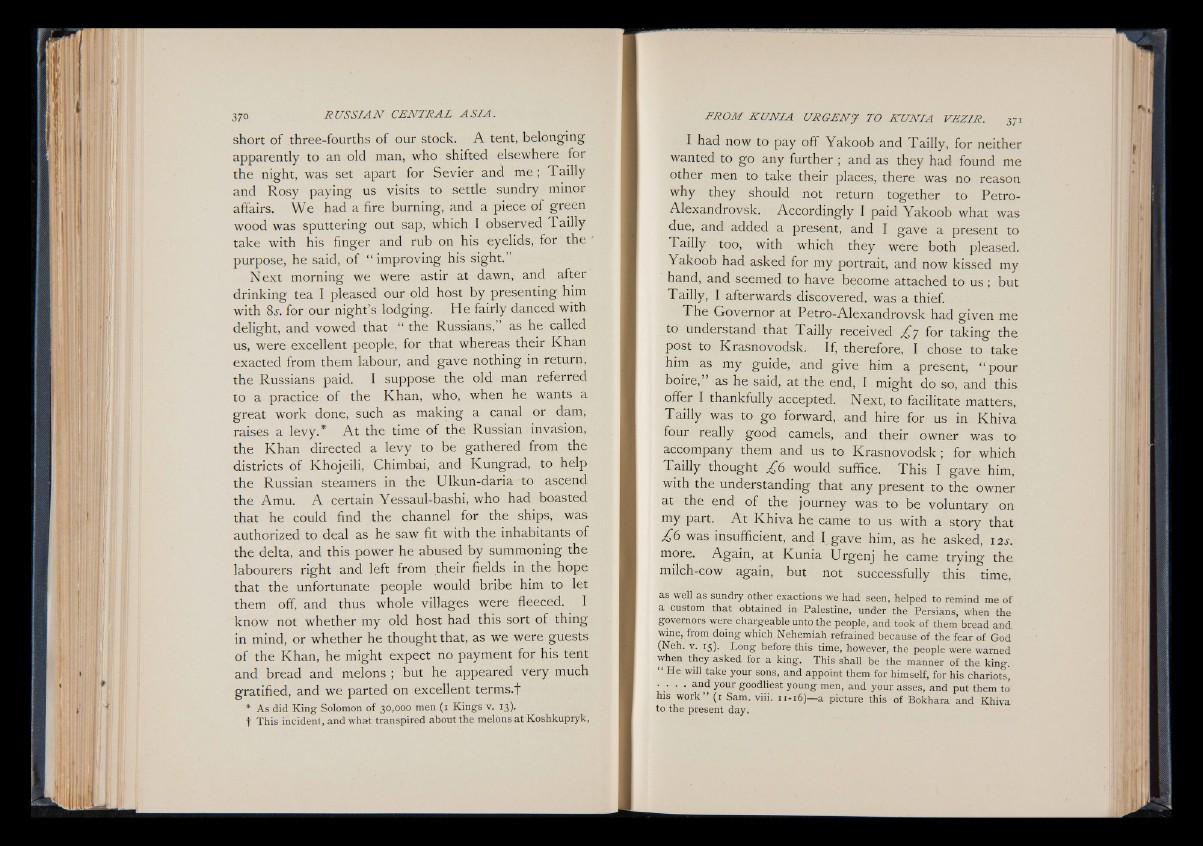
short of three-fourths of our stock. A tent, belonging
apparently to an old man, who shifted elsewhere for
the night, was set apart for Sevier and me; Tailly
and Rosy paying us visits to settle sundry minor
affairs. W e had a fire burning, and a piece of green
wood was sputtering out sap, which I observed Tailly
take with his finger and rub on his eyelids, for the
purpose, he said, of “ improving his sight.”
Next morning we were astir at dawn, and after
drinking tea I pleased our old host by presenting him
with 8s. for our night’s lodging. He fairly danced with
delight, and vowed that “ the Russians,” as he called
us, were excellent people, for that whereas their Khan
exacted from them labour, and gave nothing in return,
the Russians paid. I suppose the old man referred
to a practice of the Khan, who, when he wants a
great work done, such as making a canal or dam,
raises a levy.* A t the time of the Russian invasion,
the Khan directed a levy to be gathered from the
districts of Khojeili, Chimbai, and Kungrad, to help
the Russian steamers in the Ulkun-daria to ascend
the Amu. A certain Yessaul-bashi, who had boasted
that he could find the channel for the ships, was
authorized to deal as he saw fit with the inhabitants of
the delta, and this power he abused by summoning the
labourers right and left from their fields in the hope
that the unfortunate people would bribe him to let
them off, and thus whole villages were fleeced. I
know not whether my old host had this sort of thing
in mind, or whether he thought that, as we were guests
of the Khan, he might expect no payment for his tent
and bread and melons ; but he appeared very much
gratified, and we parted on excellent terms.t
* As did King Solomon of 30,000 men (1 Kings v. 13).
t This incident, and what transpired about the melons at Koshkupryk,
I had now to pay off Yakoob and Tailly, for neither
wanted to go any further ; and as they had found me
other men to take their places, there was no reason
why they should not return together to Petro-
Alexandrovsk. Accordingly I paid Yakoob what was
due, and added a present, and I gave a present to
Tailly too, with which they were both pleased.
Yakoob had asked for my portrait, and now kissed my
hand, and seemed to have become attached to u s ; but
Tailly, I afterwards discovered, was a thief.
The Governor at Petro-Alexandrovsk had given me
to understand that Tailly received £ 7 for taking the
post to Krasnovodsk. If, therefore, I chose to take
him as my guide, and give him a present, “ pour
boire,” as he said, at the end, I might do so, and this
offer I thankfully accepted. Next, to facilitate matters,
Tailly was to go forward, and hire for us in Khiva
four really good camels, and their owner was to
accompany them and us to Krasnovodsk; for which
Tailly thought £6 would suffice. This I gave him,
with the understanding that any present to the owner
at the end of the journey was to be voluntary on
my part. A t Khiva he came to us with a story that
£6 was insufficient, and I gave him, as he asked, 12s.
more. Again, at Kunia Urgenj he came trying the
milch-cow again, but not successfully this time,
as well as sundry other exactions we had seen, helped to remind me of
a custom that obtained in Palestine, under the Persians, when the
governors were chargeable unto the people, and took of them bread and
wine, from doing which Nehemiah refrained because of the fear of God
(Neh. v. 15). Long before this time, however, the people were warned
when they asked for a king. This shall be the manner of the king.
“ He will take your sons, and appoint them for himself, for his chariots^
. . . . and your goodliest young men, and your asses, and put them to’
his work” (1 Sam. viii. n-16)— a picture this of Bokhara and Khiva
to the present day.